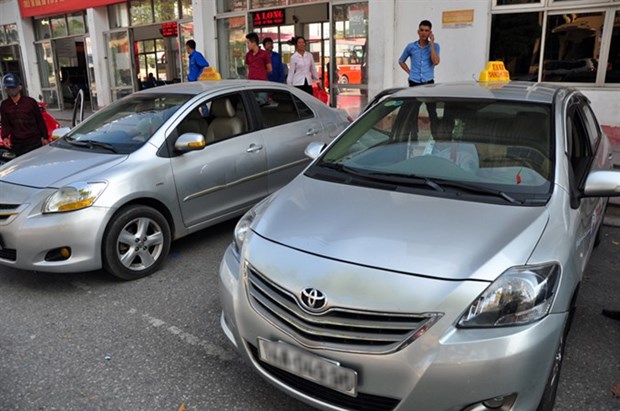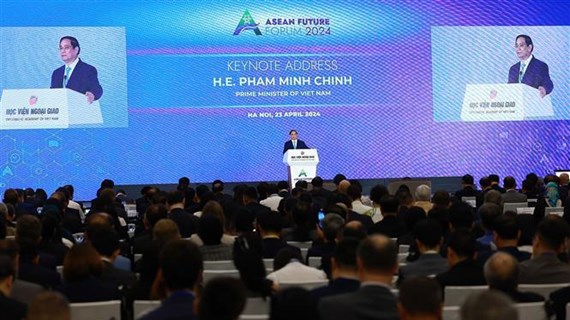Taxi firms have mixed views on proposed regulations
Taxi companies have expressed mixed views on draft regulations drawn up by the Ministry of Transport to amend Decree No 86/2014/ND-CP, which concerns automobile transportation businesses.
 Two illegal taxis wait for picking up passengers in front of the Mong Cai Coach Station in the northern province of Quang Ninh. (Photo: baoquangninh.com.vn)
Two illegal taxis wait for picking up passengers in front of the Mong Cai Coach Station in the northern province of Quang Ninh. (Photo: baoquangninh.com.vn)Hanoi (VNA) - Taxi companies have expressed mixed views on draft regulations
drawn up by the Ministry of Transport to amend Decree No 86/2014/ND-CP, which
concerns automobile transportation businesses.
Decree No 86 stipulates that enterprises and cooperatives engaged in taxi passenger transportation must have a minimum of 10 vehicles. For those operating in special urban areas, a minimum of 50 vehicles must be available.
Companies that provide transportation services for goods and passengers under contracts and undertake the transport of tourists by vehicles for a distance of over 300km must have at least 10 vehicles if they have offices based in central cities and at least five if their offices are located in other localities.
A taxi is not allowed to operate for more than eight years in special urban areas and 12 years in other localities.
In the draft regulations, which are being circulated to concerned ministries and agencies for opinions, the ministry has proposed to waive regulations on the minimum number of vehicles.
It has also stipulated that a taxi is not allowed to be used for over 12 years regardless of the place of operation.
Nguyen Anh Quan, chairman of board of directors of Thien Phong Commercial Co Ltd, which runs Thanh Cong Taxi, said the number of taxis a business has partly reflects the quality of the business operations. “Taxi firms that invest in a large number of vehicles will have to pay attention to improve quality to attract passengers. If the minimum number of vehicles is removed, it can easily lead to snatching of businesses,” Quan said.
According to Quan, in 2015, some small businesses with less than 50 taxis in Hanoi had to merge with each other so as to fulfill Decree No 86. These enterprises have been working for some time now.
Referring to the proposed age of taxis, Quan said taxis operating in Hanoi often spend more time on road than those in other cities, so their depreciation period is often shorter than taxis in other cities. Moreover, Hanoi is the capital, and clauses to maintain quality of taxi service must be stricter.
Nguyen Hong Minh, vice-chairman of the Hanoi Transportation Association and director of Nguyen Minh Taxi, said the clause that taxi businesses in Hanoi must have at least 50 cars is too rigid.
This regulation will create discrimination against small- and medium-sized enterprises, he added. The Law on Business allows enterprises to do business not prohibited by law, provided they meet the State regulations, Minh pointed out.
About the age of taxis, Minh said that regardless of where the taxis run, the quality of the cars must be certified by the Vietnam Register [an agency in charge of granting quality certifications for vehicles], and only qualified vehicles must ply, so there should be no difference in regulation for different places.
“If there is such a difference, other cities and provinces will soon become Hanoi’s landfill as businesses, after running vehicles in Hanoi for eight years, will open offices and branches in other provinces and cities and transfer their old cars there,” Minh said.
Statistics with the ministry show that majority of the taxi services are currently concentrated in major cities, particularly Hanoi and HCM City, and are recording rapid growth. Hanoi has more than 18,600 cabs managed by 88 businesses and cooperatives while in HCM City, there are nearly 10,900 vehicles operated by 23 businesses and cooperatives.-VNA
Decree No 86 stipulates that enterprises and cooperatives engaged in taxi passenger transportation must have a minimum of 10 vehicles. For those operating in special urban areas, a minimum of 50 vehicles must be available.
Companies that provide transportation services for goods and passengers under contracts and undertake the transport of tourists by vehicles for a distance of over 300km must have at least 10 vehicles if they have offices based in central cities and at least five if their offices are located in other localities.
A taxi is not allowed to operate for more than eight years in special urban areas and 12 years in other localities.
In the draft regulations, which are being circulated to concerned ministries and agencies for opinions, the ministry has proposed to waive regulations on the minimum number of vehicles.
It has also stipulated that a taxi is not allowed to be used for over 12 years regardless of the place of operation.
Nguyen Anh Quan, chairman of board of directors of Thien Phong Commercial Co Ltd, which runs Thanh Cong Taxi, said the number of taxis a business has partly reflects the quality of the business operations. “Taxi firms that invest in a large number of vehicles will have to pay attention to improve quality to attract passengers. If the minimum number of vehicles is removed, it can easily lead to snatching of businesses,” Quan said.
According to Quan, in 2015, some small businesses with less than 50 taxis in Hanoi had to merge with each other so as to fulfill Decree No 86. These enterprises have been working for some time now.
Referring to the proposed age of taxis, Quan said taxis operating in Hanoi often spend more time on road than those in other cities, so their depreciation period is often shorter than taxis in other cities. Moreover, Hanoi is the capital, and clauses to maintain quality of taxi service must be stricter.
Nguyen Hong Minh, vice-chairman of the Hanoi Transportation Association and director of Nguyen Minh Taxi, said the clause that taxi businesses in Hanoi must have at least 50 cars is too rigid.
This regulation will create discrimination against small- and medium-sized enterprises, he added. The Law on Business allows enterprises to do business not prohibited by law, provided they meet the State regulations, Minh pointed out.
About the age of taxis, Minh said that regardless of where the taxis run, the quality of the cars must be certified by the Vietnam Register [an agency in charge of granting quality certifications for vehicles], and only qualified vehicles must ply, so there should be no difference in regulation for different places.
“If there is such a difference, other cities and provinces will soon become Hanoi’s landfill as businesses, after running vehicles in Hanoi for eight years, will open offices and branches in other provinces and cities and transfer their old cars there,” Minh said.
Statistics with the ministry show that majority of the taxi services are currently concentrated in major cities, particularly Hanoi and HCM City, and are recording rapid growth. Hanoi has more than 18,600 cabs managed by 88 businesses and cooperatives while in HCM City, there are nearly 10,900 vehicles operated by 23 businesses and cooperatives.-VNA












